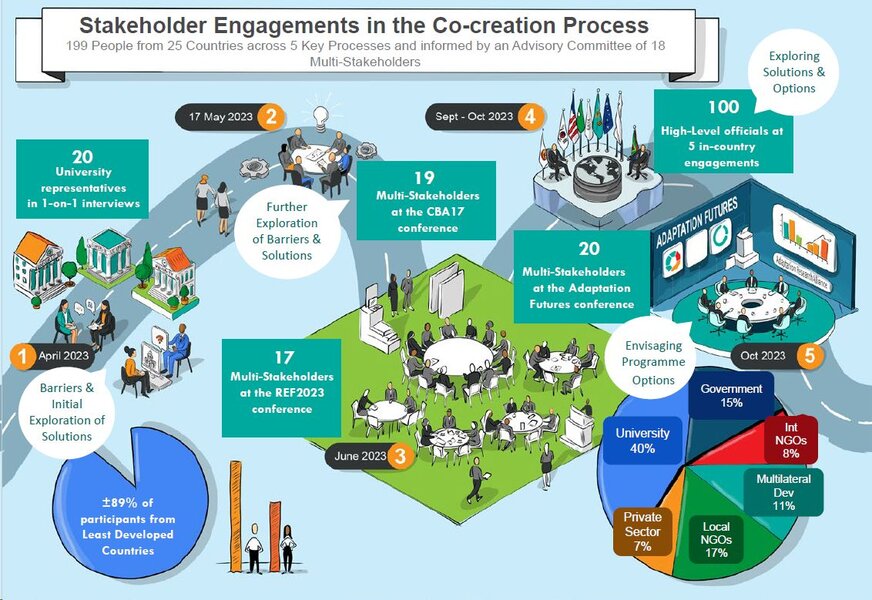
The Adaptation Research Alliance (ARA) is co-creating a new adaptation research programme that will build capacity in Least Developed Country (LDC) universities to support national adaptation efforts.
Interfer, a social enterprise focused on positive co-disruption, is working with the ARA to facilitate the co-creation of this new adaptation research programme, to be led by LDC universities.
Process of engagement
The co-creation process emerged as needs were identified. The process was guided by an Advisory Committee made up of experts from universities, government, funders and multilateral organisations working in LDCs. The Advisory Committee met regularly to give feedback and suggestions for the steps in the process.
The co-creation process started in April 2023 with 20 conversations with individuals affiliated with universities spanning 12 different LDCs across Africa, Asia and the Caribbean. These conversations focused on barriers and enablers to getting local research recognised by government in policy and practice, and gaps in knowledge and information needed to inform adaptation efforts.
These interactions helped shape engagements at the Community Based Adaptation conference (CBA17) in Bangkok, Thailand in May 2023. At CBA17, we held two conference sessions attended by ±20 representatives from universities, funders and international NGOs, and a small post-conference workshop with university staff. These activities focused on presenting findings from one-on-one interviews we had conducted, identifying further barriers to and enablers for action-oriented research, and a set of key principles to guide a new action-oriented research and engagement programme. Some initial enablers or solutions were also explored that were taken into the next workshop.
In June 2023, we hosted a workshop following the Resilience Evidence Forum in Cape Town, South Africa, attended by 20+ representatives from LDC universities, government and INGOs. In this workshop we shifted focus to spend more time exploring solutions to barriers, including sharing examples of innovative activities and programmes, and the roles that different organisations have to play in implementing these.
In August and September 2023, we supported LDC university representatives to host in-country engagements in Bangladesh, Liberia, Ethiopia, Haiti, and Mozambique with high-level stakeholders. These in-country engagements focused on understanding what new adaptation policies were being developed and implemented in these countries, and how local researchers could support these.
We then invited anyone who had engaged in the process so far to extend the invitation to join an online workshop, where we shared findings from the process and took a deeper dive into exploring different solutions.
Finally, we went to Adaptation Futures where we hosted a conference session and met with key informants from funding agencies and the coordinators of large programmes similar in nature to the types of solutions we have explored.
The outcomes and findings from these activities are detailed in the Full Findings report. A shorter overview of the process and the resulting Programme concept can be found in this Infographic Brief.
Related
- ARA launches co-creation activities for adaptation programme development
- Interim findings from the ARA Co-creation Space for an action-oriented adaptation research programme to be led by LDC Universities
- Outcomes and Programme Brief: Enabling LDC Universities to Contribute to and Support National Adaptation Action
Findings from the ARA Co-creation Space
Read the final findings from the ARA Co-creation Space to enable Least Developed Country (LDC) universities to contribute to and support national adaptation action.
